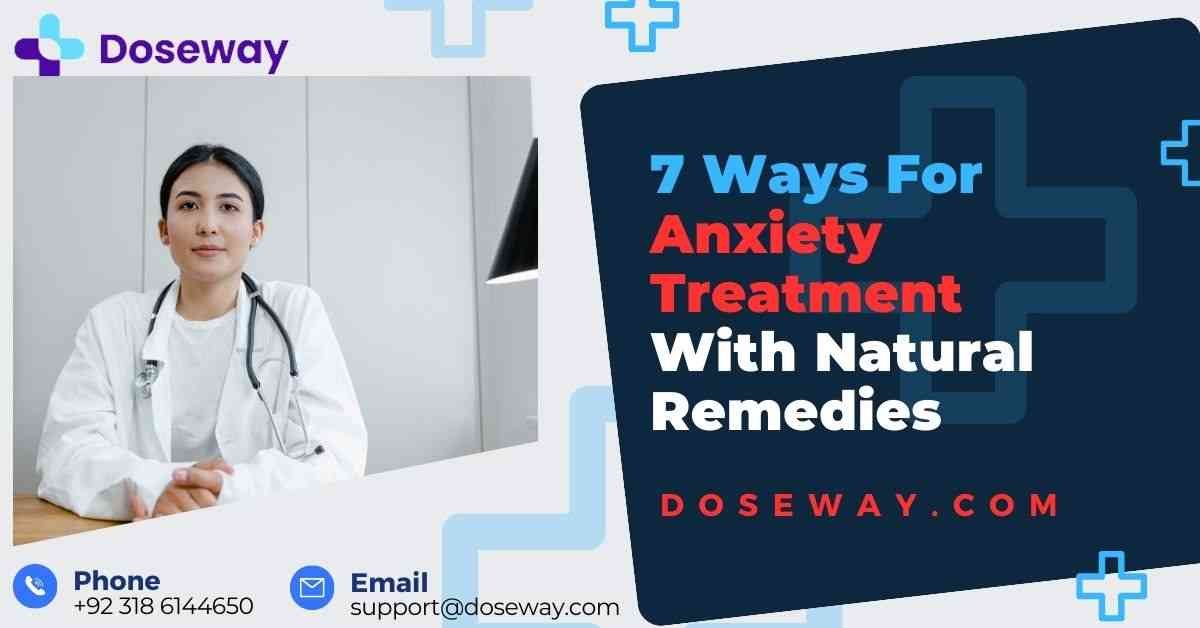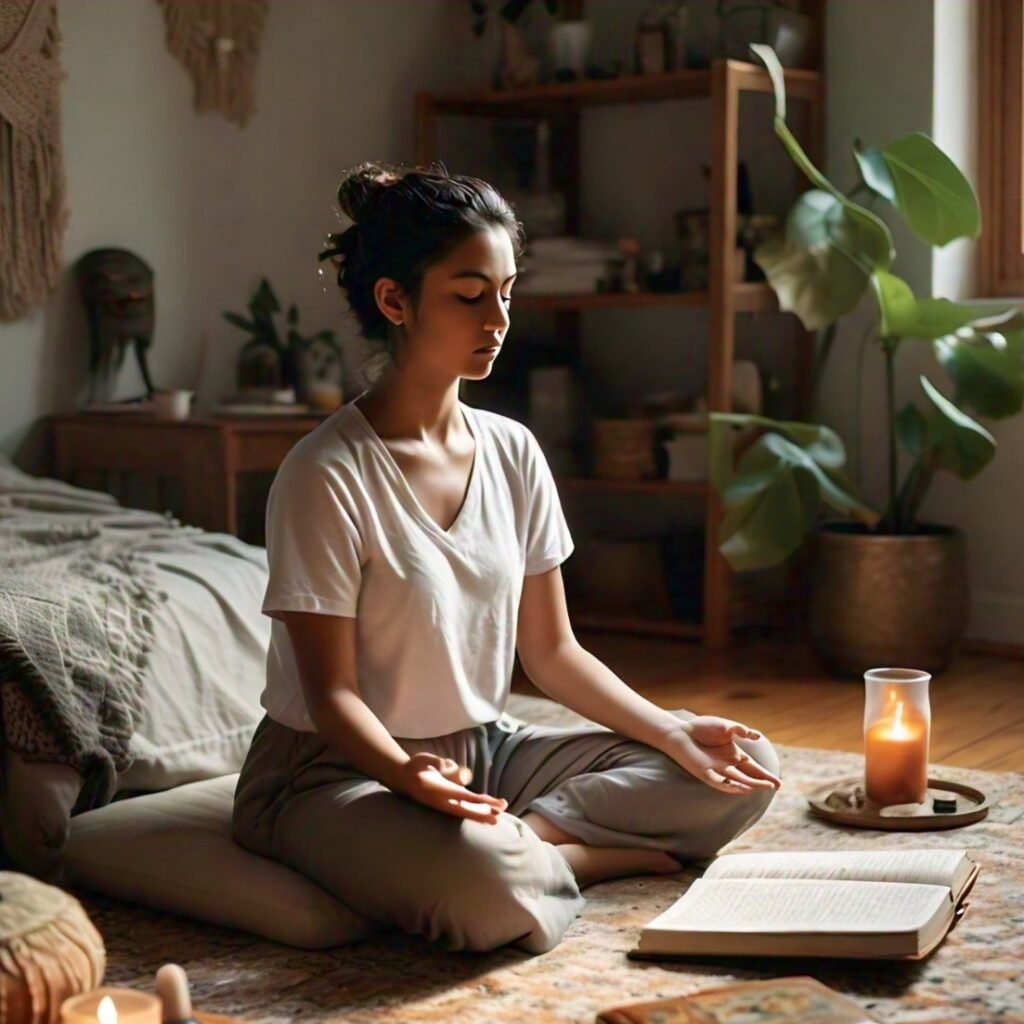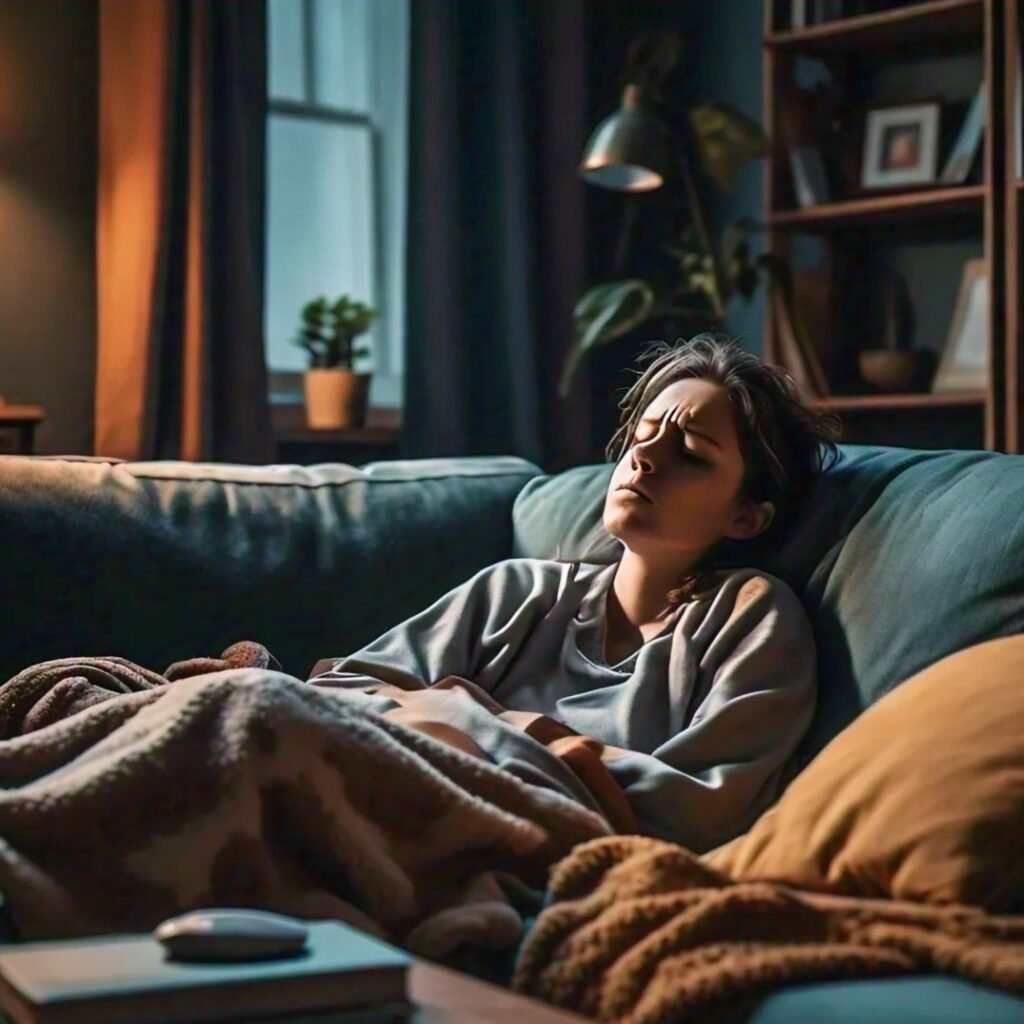Are you tired of feeling overwhelmed and consumed by anxiety? You’re not alone. Anxiety affects millions of people worldwide, impacting daily life, relationships, and overall well-being.
While anxiety treatment medications can provide temporary relief, many individuals seek alternative solutions for anxiety treatment.
In this article, we will explore the 7 effective ways of anxiety treatment without relying on medication, offering a holistic approach to achieving calmness, clarity, and a more balanced life.
Recommended Readings:
- Top 10 Tips To Get Pregnant [Fastly] | How To Get Pregnant Fast Naturally
- 10 Best Prenatal Vitamins In Pakistan [Before & During Pregnancy]
- Top 10 Brain Vitamins For Studying | Brain Supplements For Students
- Top 10 Must-Have Baby Care Products [For First-Time Moms]
Natural Remedies For Depression, Stress, & Anxiety Treatment

Table Of Contents
Understanding Anxiety
Recognizing the differences between temporary and chronic anxiety is crucial for seeking appropriate help and developing effective coping strategies.

Definition And Common Symptoms
Anxiety is a pervasive mental health condition characterized by excessive, persistent, and intrusive worry, fear, or apprehension that disrupts daily life. Common symptoms include:
- Persistent feelings of worry, fear, or dread
- Restlessness, irritability, and mood swings
- Difficulty concentrating and making decisions
- Sleep disturbances (insomnia or excessive sleep)
- Rapid heartbeat, palpitations, or tremors
- Sweating, trembling, or tingling sensations
- Nausea, abdominal discomfort, or headaches
- Avoidance behaviors (evading situations or activities)
The Impact On Mental And Physical Health
Anxiety’s far-reaching consequences extend beyond emotional turmoil, affecting both mental and physical well-being:
| Aspect | Effect |
|---|---|
| Mood | Increased risk of depression, mood swings |
| Cognition | Impaired focus, memory, and decision-making |
| Relationships | Strained relationships, social withdrawal |
| Self-Esteem | Decreased confidence, self-doubt |
| System | Effect |
|---|---|
| Cardiovascular | Hypertension, increased heart rate |
| Gastrointestinal | IBS, acid reflux, stomach ulcers |
| Immune System | Weakened immune response, increased inflammation |
| Musculoskeletal | Tension headaches, muscle pain |
Differentiating Between Temporary And Chronic Anxiety
It’s essential to distinguish between temporary anxiety, a normal response to stressful situations, and chronic anxiety, a persistent and debilitating condition.
Temporary Anxiety
- Triggered by specific events (e.g., public speaking, exams)
- Resolves once the stressor passes
- Doesn’t significantly impact daily life
Chronic Anxiety
- Persistent, excessive worry (6 months or more)
- Interferes with daily life, relationships, and productivity
- Requires professional intervention and management
Natural Remedies For Anxiety Treatment
By incorporating these natural remedies into your daily routine, you’ll be empowered to manage anxiety and reclaim a balanced, peaceful life.

Mindfulness And Meditation
Mindfulness and meditation calm the mind, reducing anxiety’s grip.
- Techniques:
- Focus on breath, body scan, or guided imagery
- Regular practice (10-30 minutes/day)
- Apps like Headspace, Calm, or Insight Timer
- Benefits:
- Decreases stress hormones (cortisol)
- Enhances emotional regulation
- Improves sleep quality
Physical Exercise
Regular physical activity is a potent anxiety reducer.
- Recommended Exercises:
- Yoga (reduces cortisol, increases GABA)
- Walking (outdoor activities enhance mood)
- Running (releases endorphins)
- How Exercise Helps:
- Reduces stress hormones
- Releases mood-boosting neurotransmitters
- Improves sleep
Diet And Nutrition
Nourish your mind with anxiety-reducing foods.
- Calming Foods:
- Fruits (berries, citrus fruits)
- Vegetables (leafy greens, broccoli)
- Omega-3-rich foods (salmon, walnuts)
- Hydration and Vitamins:
- Adequate water intake (8-10 glasses/day)
- Vitamin D, B vitamins (supplements or fortified foods)
Herbal Remedies
Harness the calming power of herbs.
- Effective Herbs:
- Chamomile (tea, supplements)
- Valerian root (tea, capsules)
- Lavender (tea, essential oil)
Aromatherapy
Inhale calmness with essential oils.
- Recommended Oils:
- Lavender (promotes relaxation)
- Bergamot (reduces anxiety)
- Ylang-Ylang (calms emotions)
- Methods:
- Diffusers
- Topical application (diluted oils)
Breathing Exercises
Breathe away anxiety with controlled techniques.
- Deep Breathing Exercises:
- Inhale deeply (4-5 seconds)
- Hold breath (2-3 seconds)
- Exhale slowly (4-5 seconds)
- Repeat (5-10 minutes)
- Benefits:
- Immediate relaxation
- Reduces stress hormones
- Improves focus
Lifestyle Changes
Transform your lifestyle to manage anxiety.
- Sleep Routine:
- Establish a consistent sleep schedule
- Avoid screens before bedtime
- Reducing Stimulants:
- Limit caffeine intake
- Avoid alcohol
- Stress Management:
- Prioritize tasks
- Practice relaxation techniques
Integrating Remedies Into Daily Life
Implementing natural remedies into your daily routine can be transformative. Learn how to create a balanced regimen, overcome obstacles, and maximize effectiveness.
Crafting A Balanced Routine
- Start Small: Introduce 2-3 remedies initially, gradually adding more.
- Prioritize: Focus on the most effective remedies for your anxiety.
- Schedule: Allocate specific times for each remedy.
- Flexibility: Adapt routine as needed.
Sample Routine
- Morning: Meditation (10 minutes), Yoga (30 minutes)
- Afternoon: Deep Breathing Exercises (5 minutes), Herbal Tea (Chamomile)
- Evening: Aromatherapy (Lavender), Journaling
Maintaining Consistency
- Track Progress: Journal or mobile apps for monitoring.
- Accountability: Share goals with a friend or mentor.
- Reward System: Celebrate milestones.
- Patience: Allow time for remedies to take effect.
Overcoming Challenges
- Identify Obstacles: Recognize patterns or triggers.
- Adjust Routine: Adapt to overcome challenges.
- Seek Support: Consult professionals or support groups.
- Self-Compassion: Treat yourself with kindness.
Combining Remedies For Enhanced Effectiveness
- Mindfulness + Exercise: Meditate before yoga.
- Aromatherapy + Breathing: Inhale essential oils during deep breathing.
- Herbal Remedies + Nutrition: Consume calming teas with anxiety-reducing foods.
Synergistic Combinations
| Remedies | Benefits |
|---|---|
| Mindfulness + Exercise | Enhanced mood, reduced stress |
| Aromatherapy + Breathing | Deep relaxation, reduced anxiety |
| Herbal Remedies + Nutrition | Amplified calming effects, improved mood |
| Meditation + Journaling | Increased self-awareness, emotional regulation |
The Role Of Sleep In Managing Anxiety
Sleep and anxiety are intricately linked. Quality sleep significantly impacts anxiety levels, and poor sleep exacerbates symptoms.

The Sleep-Anxiety Cycle
- Anxiety disrupts sleep quality
- Poor sleep intensifies anxiety
- Vicious cycle perpetuates
How Sleep Quality Affects Anxiety Levels
- Regulation of Emotions: Sleep helps process emotions, reducing anxiety
- Stress Hormone Regulation: Sleep influences cortisol levels
- Brain Function: Sleep impacts cognitive processing, memory consolidation
Tips For Improving Sleep Hygiene
Pre-Sleep Routine
- Consistent Schedule: Establish a regular sleep schedule
- Relaxation Techniques: Practice gentle stretches, meditation, or deep breathing
- Screen-Free Time: Avoid electronic devices (1-2 hours before bed)
- Calming Environment: Dim lighting, soothing temperatures
Sleep-Conducive Habits
- Avoid Stimulants: Limit caffeine, nicotine, and heavy exercise before bedtime
- Comfortable Sleep Space: Invest in a supportive mattress and pillows
- Avoid Heavy Meals: Finish eating 2-3 hours before bedtime
- Morning Sunlight Exposure: Regulates circadian rhythms
Additional Strategies
- Journaling: Process thoughts, and emotions before bed
- Aromatherapy: Utilize calming essential oils (Lavender, Chamomile)
- White Noise: Mask disturbing sounds
- Mindfulness: Practice mindfulness during wakeful moments
Optimal Sleep Recommendations
- 7-9 hours of sleep per night
- Establish a consistent sleep-wake cycle
- Gradually adjust sleep schedule if needed
By prioritizing sleep hygiene and adopting these strategies, you can:
- Reduce anxiety symptoms
- Enhance emotional regulation
- Improve overall well-being
Cognitive Behavioral Techniques
Cognitive Behavioral Therapy (CBT) is a potent tool for managing anxiety. Learn how to harness CBT techniques to challenge negative thoughts and cultivate emotional resilience.
Overview Of CBT Techniques
CBT focuses on:
- Identifying Distorted Thoughts: Recognize unhealthy thinking patterns.
- Challenging Negative Beliefs: Replace with balanced, constructive thoughts.
- Behavioral Changes: Implement constructive actions.
Simple CBT Exercises To Practice At Home
Thought Record
- Record triggering situations and emotions.
- Identify negative thoughts.
- Challenge and reframe thoughts.
Cognitive Restructuring
- Identify distorted thoughts.
- The challenge with evidence.
- Replace with balanced thoughts.
Grounding Techniques
- Focus on the present moment.
- Engage senses (sight, sound, touch).
- Reduce anxiety.
Exposure Therapy
- Gradual exposure to feared situations.
- Manage anxiety in controlled steps.
- Build confidence.
Self-Compassion Exercise
- Practice self-kindness.
- Challenge self-criticism.
- Foster positive self-image.
CBT Exercises To Manage Anxiety
| Exercise | Benefits |
|---|---|
| Thought Record | Identifies distorted thoughts, promotes awareness |
| Cognitive Restructuring | Challenges negative beliefs, fosters balanced thinking |
| Grounding Techniques | Reduces anxiety, promotes mindfulness |
| Exposure Therapy | Builds confidence, manages fear |
| Self-Compassion | Fosters positive self-image, reduces self-criticism |
Additional Resources
- CBT workbooks and online courses
- Mobile apps (Calm, Headspace)
- Consult with a licensed therapist
Exploring Alternative Therapies
Beyond conventional treatments, alternative therapies offer promising solutions for anxiety management. Discover how acupuncture, Reiki, and other holistic approaches can complement natural anxiety treatments.
Overview Of Alternative Therapies
Acupuncture
- Ancient Chinese practice
- Insert fine needles into specific points
- Balances energy (qi), reduces stress
Reiki
- Japanese energy healing
- Transfers universal energy through touch
- Promotes relaxation, harmony
Massage Therapy
- Manipulates soft tissue
- Reduces muscle tension, stress
- Enhances relaxation response
Reflexology
- Target specific pressure points
- Stimulates the body’s natural healing
- Reduces anxiety, promotes calm
Mind-Body Therapies
- Yoga, tai chi, qigong
- Integrates physical movement, breathwork
- Reduces stress, enhances well-being
How Alternative Therapies Complement Natural Anxiety Treatments
- Reduces symptoms: Alternative therapies alleviate anxiety symptoms.
- Enhances relaxation: Promotes deep relaxation, reducing stress.
- Improves mood: Balances emotions, and fosters a positive outlook.
- Increases self-awareness: Encourages mindfulness, and self-reflection.
Combining Alternative Therapies With Natural Remedies
| Alternative Therapy | Natural Remedy | Benefits |
|---|---|---|
| Acupuncture | Herbal supplements | Enhanced relaxation, reduced anxiety |
| Reiki | Mindfulness meditation | Increased calm, emotional balance |
| Massage Therapy | Aromatherapy | Reduced muscle tension, improved mood |
| Reflexology | Deep breathing exercises | Improved circulation, reduced stress |
| Yoga | Nutrition | Balanced energy, enhanced well-being |
Finding a Qualified Practitioner
- Research local practitioners
- Check certifications, experience
- Schedule consultation
Integrating Alternative Therapies Into Your Routine
- Start with one therapy
- Schedule regular sessions
- Combine with natural remedies
Managing Anxiety In Specific Situations
Anxiety can strike in various contexts. Develop situation-specific coping mechanisms to navigate:
Social Settings
Strategies:
- Prepare Ahead: Visualize success, and practice relaxation techniques.
- Focus on Others: Engage in meaningful conversations.
- Take Breaks: Step outside, recharge.
- Support System: Surround yourself with positive influences.
Social Anxiety Hacks:
- Arrive early to familiarize yourself
- Use positive self-talk
- Practice active listening
Work Environments
Strategies:
- Prioritize Tasks: Break tasks into manageable chunks.
- Communicate with Colleagues: Share concerns, seek support.
- Take Regular Breaks: Stretch, move, relax.
- Set Boundaries: Establish realistic work-life balance.
Workplace Anxiety Hacks:
- Create a calming workspace
- Use productivity tools
- Schedule self-care time
Travel
Strategies:
- Plan Ahead: Research, prepare itinerary.
- Stay Connected: Regular updates with loved ones.
- Pack Comfort Items: Familiar objects provide reassurance.
- Mindfulness: Focus on present moments.
Travel Anxiety Hacks:
- Book accommodations strategically
- Use travel apps
- Bring relaxation materials (books, meditation)
Herbal Remedies For Anxiety And Depression
- Chamomile
- Lavender
- Valerian root
- St. John’s Wort (consult professional)
Frequently Asked Questions (FAQs) – Anxiety Treatment
What are the main causes of anxiety?
Anxiety can stem from genetic predisposition, environmental factors, trauma, stress, medical conditions, or substance abuse.
How does anxiety affect relationships?
Anxiety can lead to social withdrawal, communication difficulties, emotional reactivity, and strained relationships.
What is the difference between anxiety and depression?
Anxiety involves excessive worry and fear, while depression is characterized by persistent sadness and loss of interest.
Can anxiety be cured completely?
While anxiety cannot be completely cured, effective management through therapy, self-help strategies, and lifestyle changes can significantly reduce symptoms.
How long does it take to recover from anxiety?
Recovery time varies depending on individual circumstances, treatment approaches, and consistency of effort; progress often occurs within 6-12 months.
What are some anxiety-reducing activities?
Engage in yoga, walking, swimming, meditation, reading, journaling, or creative pursuits.
Can anxiety affect physical health?
Yes, chronic anxiety can lead to cardiovascular issues, gastrointestinal problems, sleep disturbances, and weakened immune function.
What are some common anxiety triggers?
Triggers include work stress, financial concerns, relationships, health issues, major life changes, and traumatic events.
How does mindfulness help anxiety?
Mindfulness practices increase self-awareness, reduce rumination, and enhance relaxation.
How does exercise impact anxiety?
Regular exercise reduces anxiety symptoms by releasing endorphins and promoting relaxation.
………………………….
Disclaimer:
Commissions we earn from partner links on this page do not influence our content. Our editorial content is based on thorough research and insights from qualified medical professionals to ensure the highest standards of accuracy and reliability.
Information provided on Doseway is for educational purposes only. Your health and wellness are unique to you, and the products and services we review may not be suitable for your circumstances. We do not offer personal medical advice, diagnosis, or treatment plans. For specific advice, please consult with a healthcare professional. Doseway adheres to strict editorial integrity standards. To the best of our knowledge, all content is accurate as of the date posted, though offers and information may change. The opinions expressed are the author’s own and have not been influenced, approved, or endorsed by our partners.
……………………………..

 Cart is empty
Cart is empty
Add a Comment